 Source: Bandai Namco
Source: Bandai Namco
The boss fights are the core of each FromSoftware fantasy RPG, and that hasn’t changed with the studio’s latest title, Elden Ring. The game is full of grand, memorable boss fights that are both incredibly challenging and full of spectacle. As you explore the Lands Between and make your way through its various regions, you’ll find that a battle with an imposing and legendary foe is never more than a few minutes away.
After completing my first playthrough of Elden Ring as a Strength/Faith melee user and getting close to finishing my second on an Intelligence sorcerer, I’ve fully formed and solidified my opinions on Elden Ring’s main bosses — that is, bosses that have to be beaten in order to progress or bosses that hold one of the five Great Runes. Therefore, I’ve rated each major boss bout and compared my thoughts to what other players are feeling.
15. Godskin Duo

The Godskin Duo fight is like if you had the Ornstein and Smough fight from the original Dark Souls, but without any of the smart design choices that gave players ways to kite the bosses and separate them from one another. Unlike the Ornstein and Smough fight where Smough was slower than Ornstein, both bosses in the Godskin Duo move at the same speed. This often results in you getting brutally ganked by both bosses at the same time since you can’t separate them unless you have a co-op player distracting one of them (or a Mimic Tear). They both also spam blight fireballs constantly from range, which is infuriating.
Like Ornstein and Smough’s arena, the stage for the Godskin Duo battle also has pillars you can use for cover. However, they’ll inevitably get destroyed once one of the duo starts to do special attacks when they reach half health, permanently eliminating the few safe spaces you could use to heal or avoid fireballs. The larger boss with the rapier can also stab you through the pillars, which is nothing short of enraging.
And finally, because the fight already didn’t suck enough, FromSoftware made it so the Godskin Duo have a shared health bar that requires you to kill each boss twice (or one boss four times). You can’t make the fight permanently easier by focusing down one boss and then killing the other when they’re alone; each boss just revives the other one until their shared health bar is fully depleted. Ultimately, this fight is garbage, and is right up there with the Bed of Chaos and the Ancient Dragon as some of the worst boss fights made by the studio.
14. Red Wolf of Radagon

The Red Wolf of Radagon, which you encounter in the Raya Lucaria Academy, isn’t necessarily bad, it’s just mind-numbingly boring. The majority of the fight comes down to sprinting left or right to strafe the glintblade magic attacks that the wolf spams and spams at you. Every so often, the Red Wolf will lunge in and attempt to bite you, at which point you can dodge and then usually land a hit or two. Half the time, though, the boss will simply lunge away before you even have a chance to swing your weapon, resuming its endless onslaught of magic attacks.
The boss does eventually start using some attacks that are more engaging to avoid, such as explosive magical projectiles that can’t be strafed and have to be actively dodged. Still, the fact the Red Wolf runs around the outskirts of the arena and spams glintblades for most of the fight makes the majority of it feel like an absolute drag. That, paired with how the boss often jumps away before you can get hits in of your own, makes this one of my least favorite bosses.
13. Sir Gideon Ofnir, the All-Knowing

Something I wasn’t expecting in Elden Ring’s endgame is an NPC-style boss fight, but that’s exactly what we got with Sir Gideon Ofnir, the All-Knowing. With his infinite FP bar and a mastery of both sorcery and incantations, Sir Gideon has proven to be quite a challenge for many players. The wide variety of his magic attacks makes the fight interesting, and I enjoyed figuring out how to keep pressure on him as he desperately threw spell after spell my way.
That being said, this is essentially just a PvP fight against an Int/Faith build. While I enjoy battles like that from time to time, I strongly prefer ones that feature unique opponents and movesets.
12. Starscourge Radahn
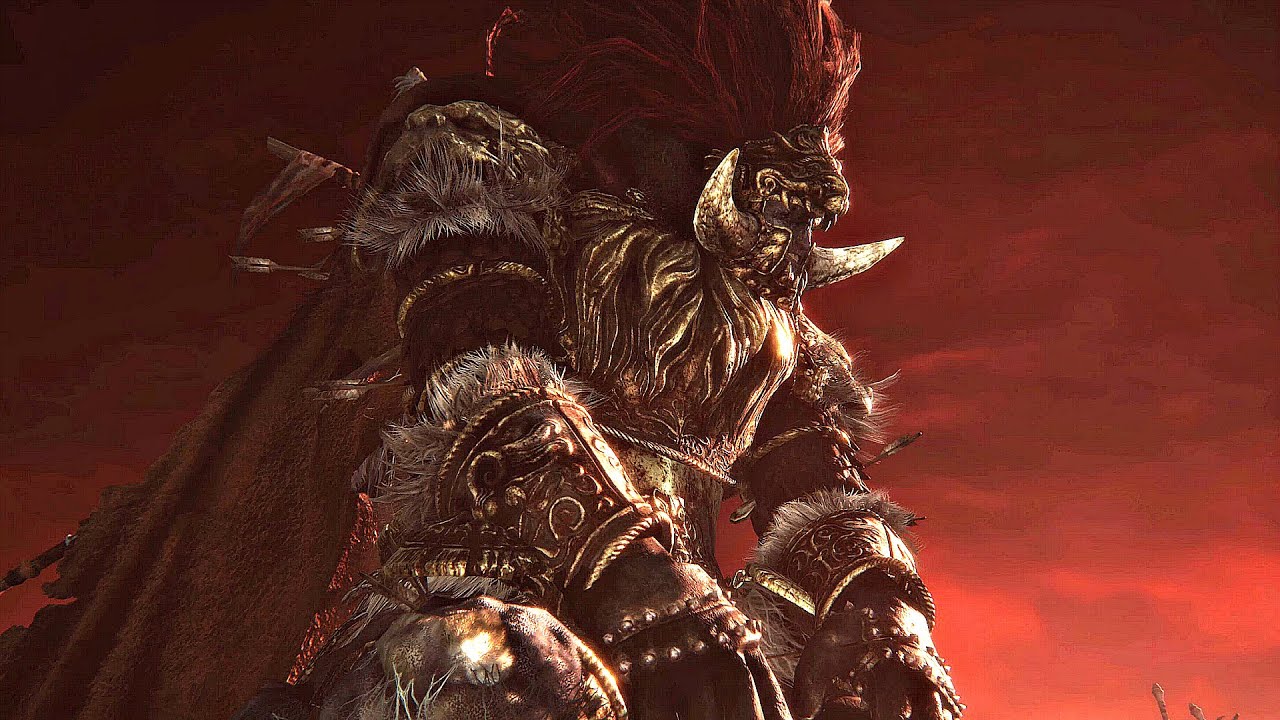
As far as arenas and atmosphere go, Starscourge Radahn is probably my favorite fight in the entire game. Charging across a war-torn battlefield towards the legendary warrior with an army of NPC summons in tow with a war chant-filled soundtrack is an incredible feeling.
Unfortunately, I feel that Radahn’s moveset is simply way too overtuned for how big he is. His melee combos are incredibly hard to dodge, which I wouldn’t mind if the camera didn’t struggle to show me his wind-up animations half of the time. He also deals a crazy amount of damage, especially in his second phase where many of his gravity magic attacks are capable of one-shotting players.
Ultimately, the fight just ends up being incredibly frustrating no matter what you do, especially if you’re a melee character. It’s an easier battle if you’re a sorcerer since you can hop on Torrent and attack him while your summons distract him, but sometimes he’ll aggro onto you and you’ll have to desperately try to survive his onslaught.
Starscourge Radahn has been nerfed in Elden Ring Version 1.03. His melee attacks now have smaller hitboxes and his gravity magic does less damage. After I fight the patched version of him in a future playthrough, he may move to a higher rank on my list.
11. Fire Giant
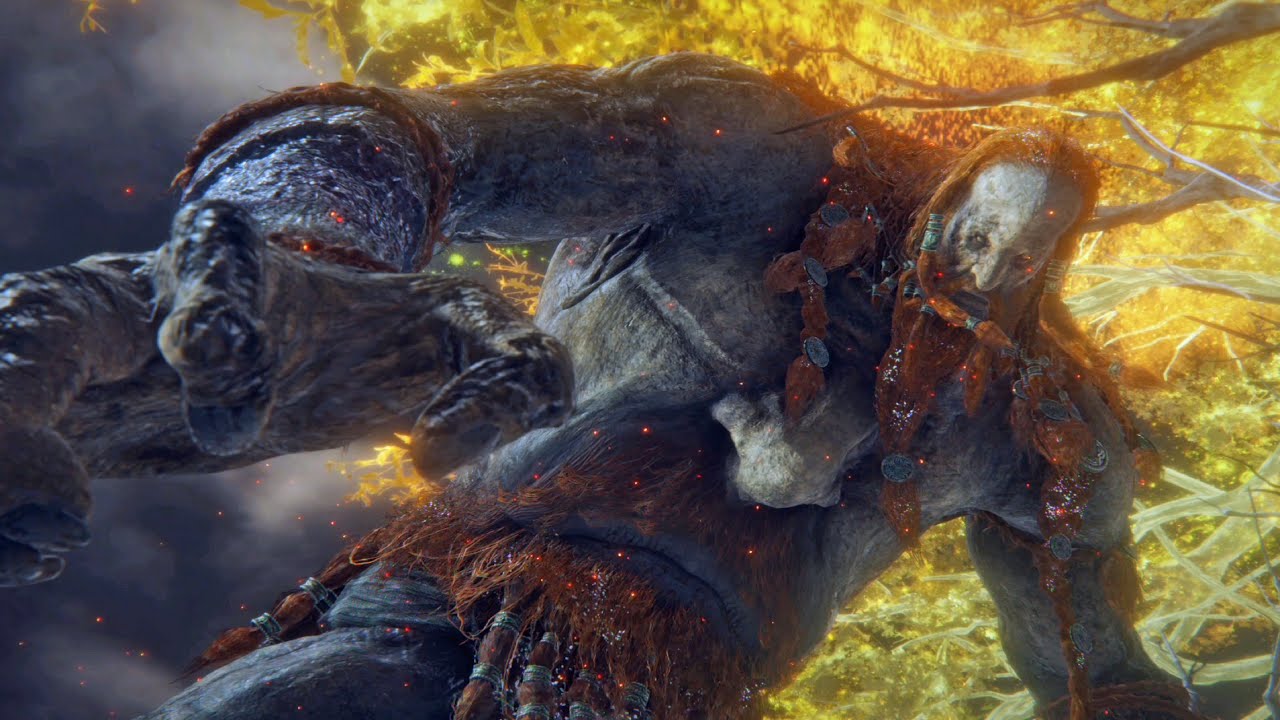
The Fire Giant is essentially Radahn but with less brutal melee combos that are more fitting for an opponent that’s significantly bigger than you are. His attacks do a ton of damage, but they’re telegraphed and are slow enough that you can see them coming. It can still be very difficult to see what’s going on thanks to camera issues, but I was able to at least hear when an attack was coming by listening to the Fire Giant’s movements. His fire magic attacks can be hard to avoid, but they’re far from unfair. I also love the weak spot he has on his wounded left ankle, which amplifies your damage when hit. This fairness continues even into the second phase.
Aside from the camera issues, the only thing I really don’t like about this fight is how gigantic the Fire Giant’s health bar is. The fight ends up dragging on for several minutes because of it, especially since the Fire Giant often rolls away, making it difficult to land several hits in succession.
10. Rennala, Queen of the Full Moon
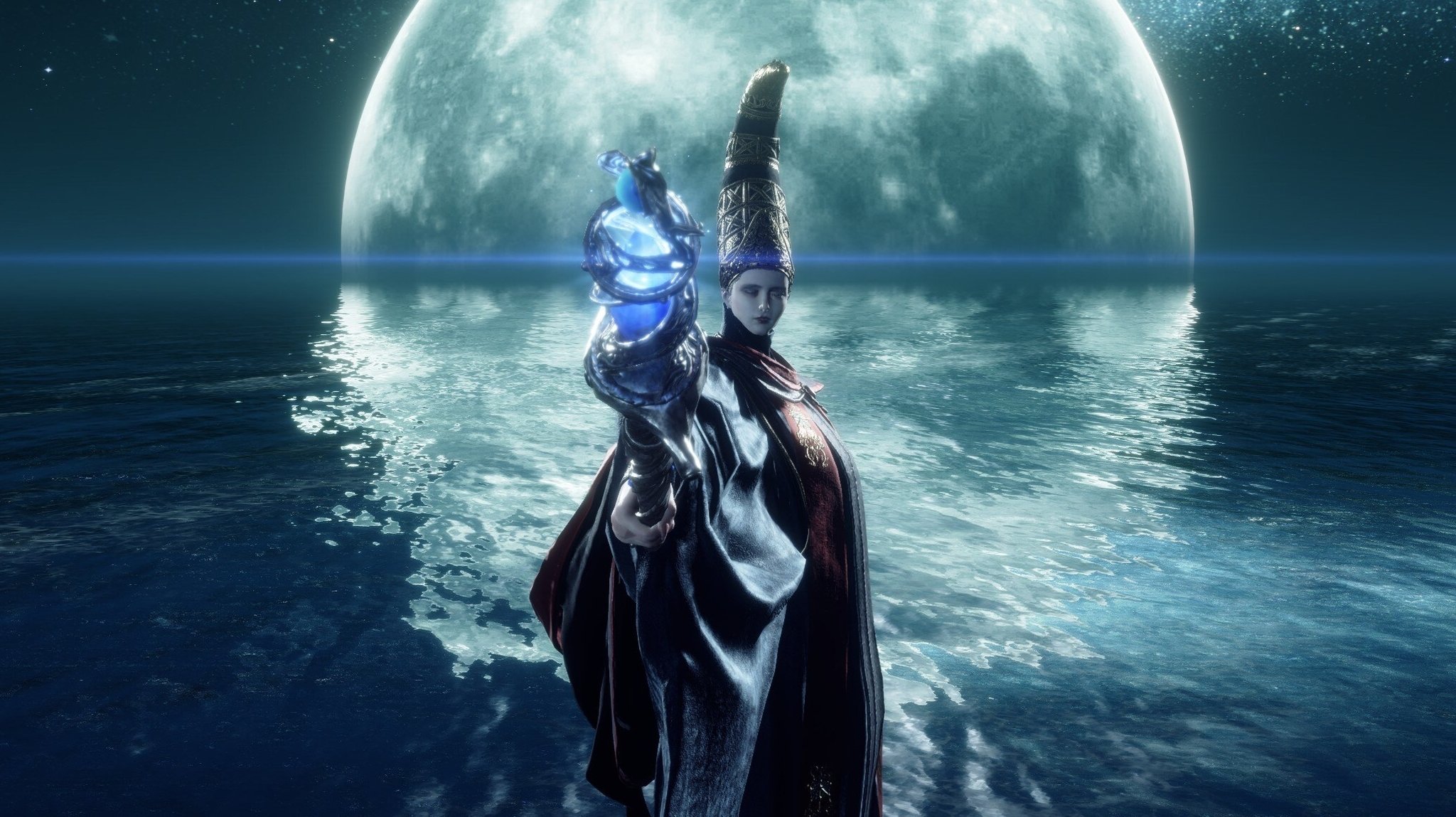
The battle with Rennala, Queen of the Full Moon is gimmicky, but it’s still enjoyable. The first phase requires you to find and hit three enemies in the boss arena that have a golden aura and are singing before Rennala launches projectiles at you, adding a unique auditory element to the encounter. You can then damage Rennala.
In the second phase, you have to try and get close to Rennala while strafing her magic attacks. Once you do, you can hit her several times in quick succession since she doesn’t have any poise. Eventually, Rennala will begin summoning spirits to help her, forcing you to dodge them while also still closing the distance with the boss and hitting her repeatedly. The spirits can get a bit annoying at times, but overall, I found the emphasis on spacing and positioning in this phase very fun. I still enjoyed Elden Ring’s more “traditional” boss fights more, but the bout with Rennala is nevertheless a nice change of pace.
9. Margit, the Fell Omen
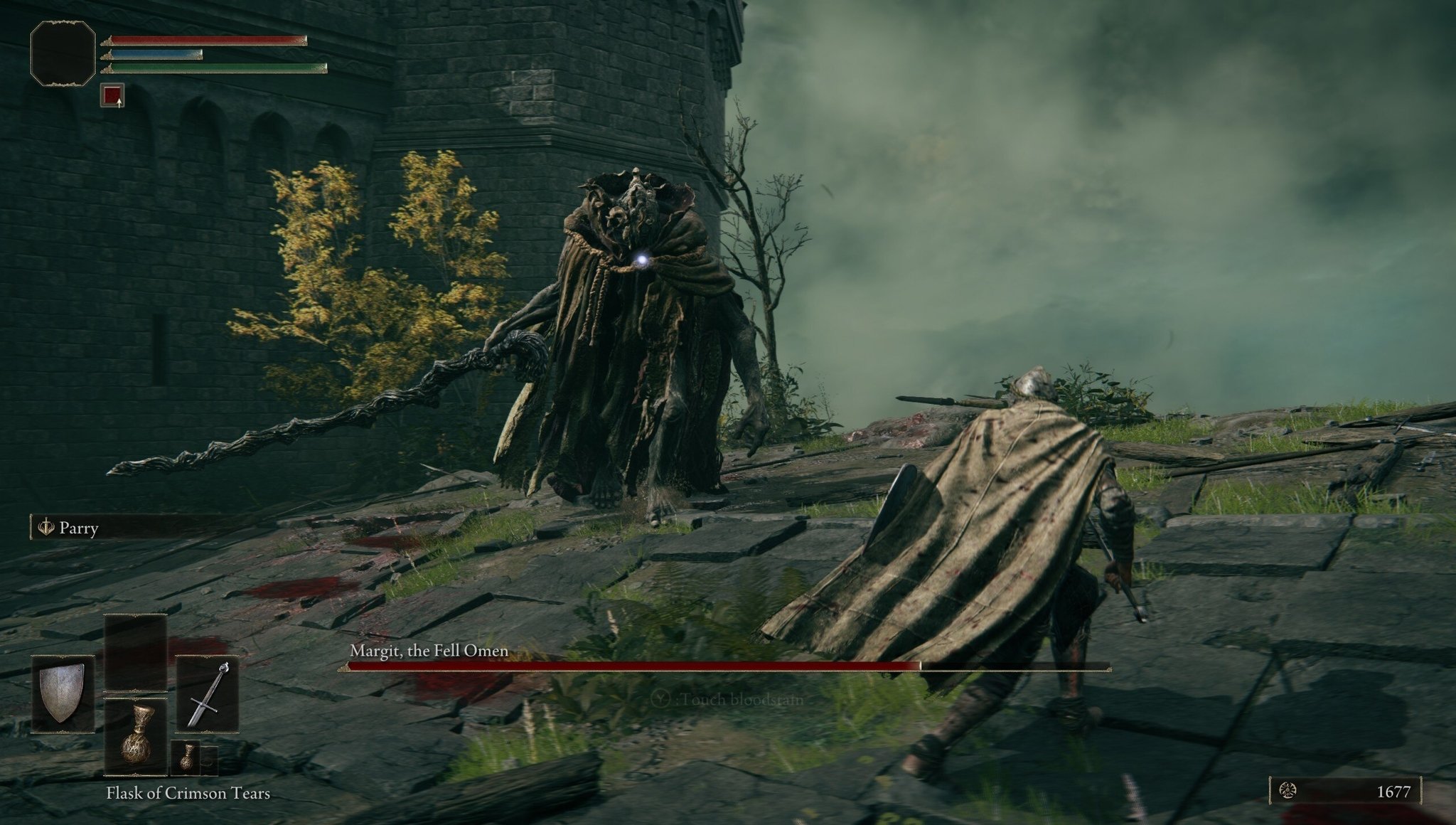
Margit, the Fell Omen is Elden Ring’s first major boss, and I think he’s a good one overall. While I think he’s a little too difficult as the game’s first major boss, it never feels unfari. His delayed attacks and melee combos are difficult to get used to, even for Souls veterans, but they’re very readable. His moveset also has a number of different attacks that keep the battle dynamic, including thrusts, slams, dagger throws, and more. You can also parry Margit, too, giving players that are good at using the mechanic a way to land devastating critical hits.
In his second phase, Margit begins incorporating the use of a magic sword and magic greathammer. Dodging these weapons is tough, but if players succeed, they’re rewarded with large windows of opportunity to attack Margit before he recovers and begins another assault.
8. Morgott, the Omen King

Morgott is essentially an advanced version of Margit who uses similar types of attacks, but spices things up with a magical spear, several new combos, a handful of unique area-of-effect magic moves, and a faster overall attack speed. Additionally, whereas Margit used his cane in combat, Morgott transforms his into a unique sword that he can buff with holy damage or bloodflame.
All of these new moves make Morgott considerably tougher than Margit, but I loved overcoming the challenge. Nothing about this fight is unfair in any way, and this battle in the Royal Capital of Leyndell felt like a test to see how much I grew as a player since my encounter with Margit all the way back in Limgrave.
7. Malenia, Blade of Miquella
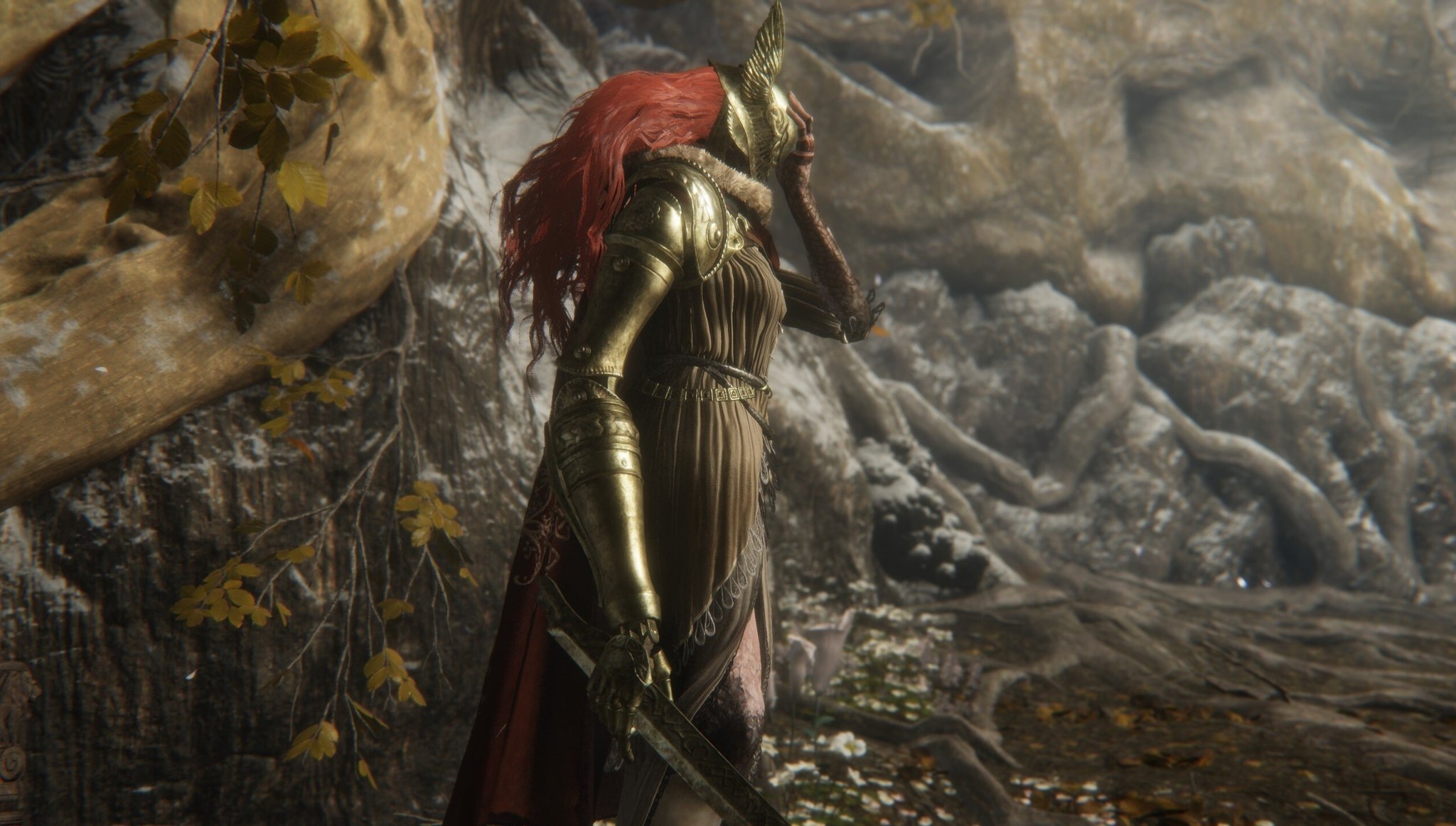
The fight with Malenia, Blade of Miquella is one I was looking forward to ever since she was shown off in the reveal trailer, and overall, the battle with her lives up to the hype. Malenia’s attack chains and special moves are brutal — she’s undoubtedly the hardest boss in the game — but with patience and practice, you can learn to avoid them masterfully and take advantage of Malenia’s low poise by landing hits. Her second phase is also an incredible physical spectacle. My jaw was on the floor when she began her “butterfly phase.” The flower-filled arena you fight her in is gorgeous, too, and the music is nothing short of spectacular.
The one thing that keeps this fight from being higher on the list is that Malenia can lifesteal. This activates every time she hits you (including when you’re blocking with a shield). Her attacks already deal huge damage and are difficult to avoid, so I don’t really understand why FromSoftware felt like players needed to be punished even more.
6. Rykard, Lord of Blasphemy
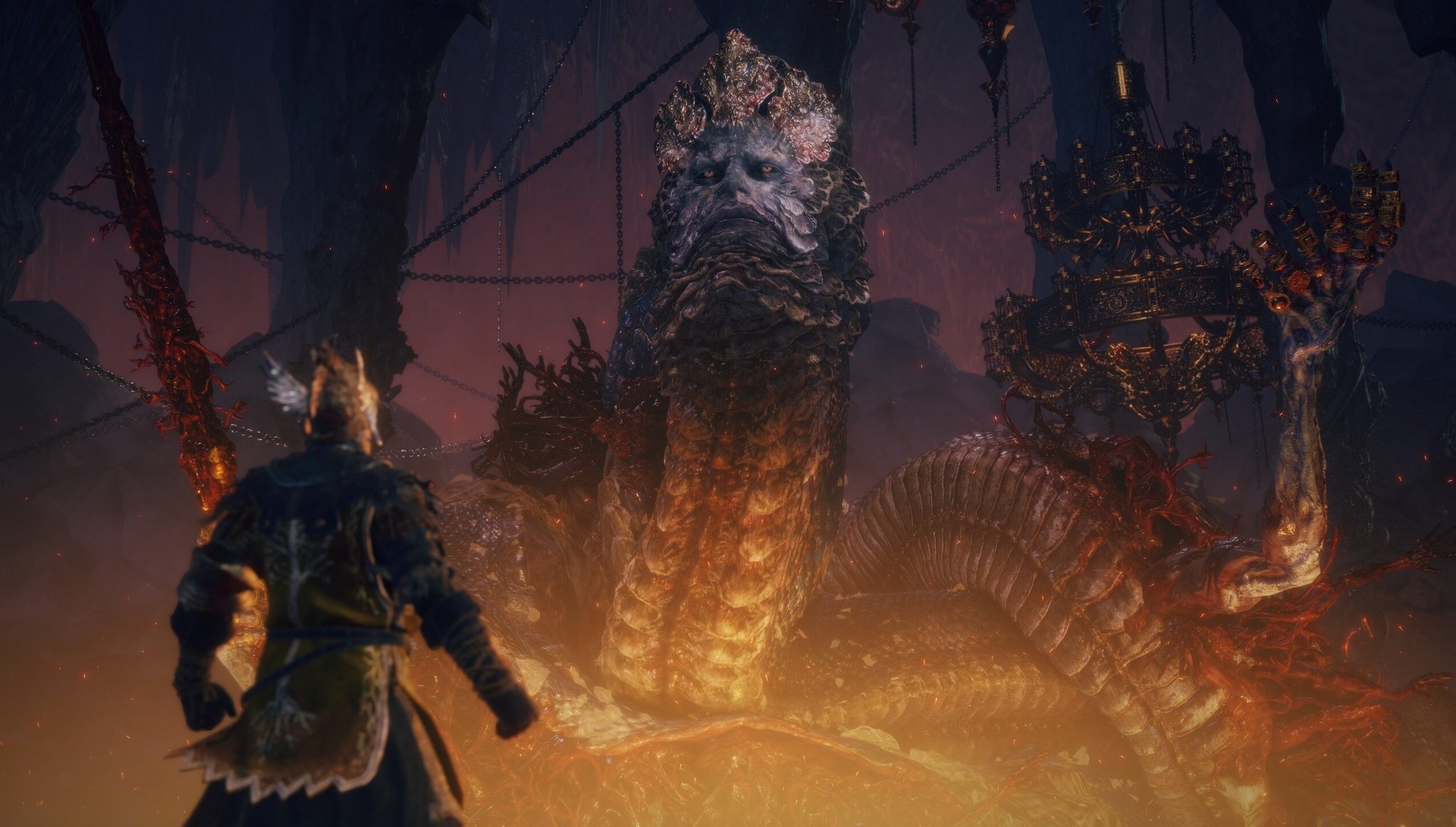
Yhorm the Giant was one of Dark Souls 3’s more interesting bosses since you needed to use the special Storm Ruler weapon to take him down, but the fight was way too simple overall. FromSoftware created a similar mechanic with Rykard, Lord of Blasphemy and the Serpent-Hunter swordspear that you can find at the entrance to his arena, This time, the fight was significantly more enjoyable.
In the first phase, the bites, slams, grabs, and poison spits come out quicker and more frequently than Yhorm’s slow and sluggish attacks ever did, making this battle feel much more energetic. In addition, Rykard’s attacks are also clear, whereas Yhorm’s could often be difficult to see coming due to his large size and small arena. In the second phase, Rykard mixes up his moveset with delayed sword slashes and barrages of explosive fire magic that ramp up the intensity and keep players on their toes. Pair this excellent gameplay with his hellish arena and tense boss theme, and you have one of Elden Ring’s most unique and engaging boss fights.
5. Mohg, Lord of Blood
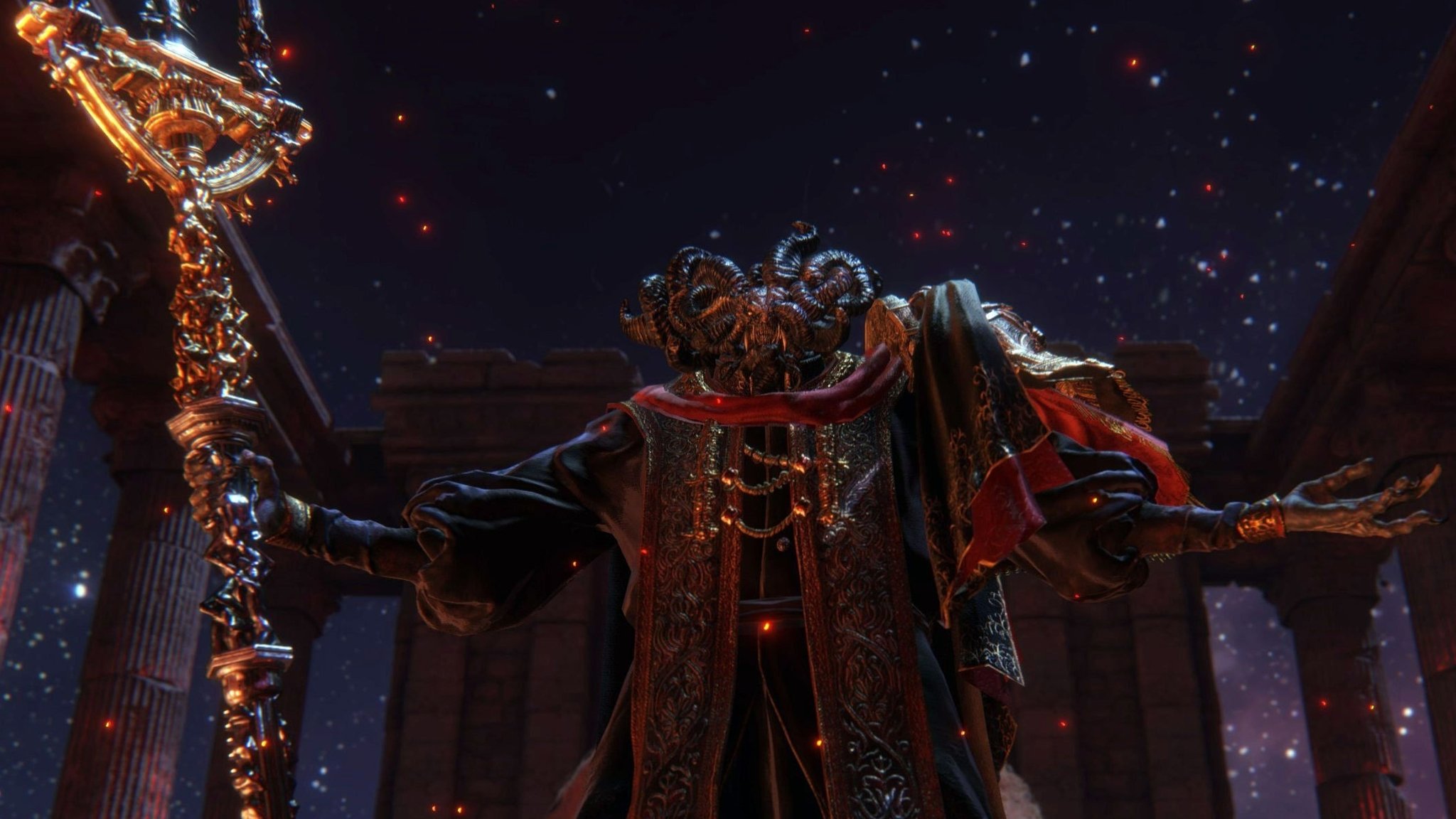
Many players will probably miss Mohg, Lord of Blood. It’s easy to pass by White-Faced Varre’s questline, which you need to do to reach him, and that’s a shame since Mohg is one of Elden Ring’s best bosses. His attacks are very readable, yet still challenging to avoid since there’s a ton of variety, like when he mixes up delayed melee strikes with his trident and magical bloodflame projectiles. His attacks also cause Bleed buildup, which forces players to respect his moveset even if they have very high health and poise, which I appreciate. I also love that players who explore and find the Purifying Crystal Tear are rewarded in this fight, as its effects prevent the blood curse Mohg performs at the end of Phase 1 from hurting you.
The fight gets even better in the second phase, where Mohg sprouts wings and begins incorporating flying sweeps and thrusts into his attacks. Overall, the battle with Mohg is a fantastic, varied one, and I’m looking forward to fighting him again.
4. Maliketh, the Black Blade
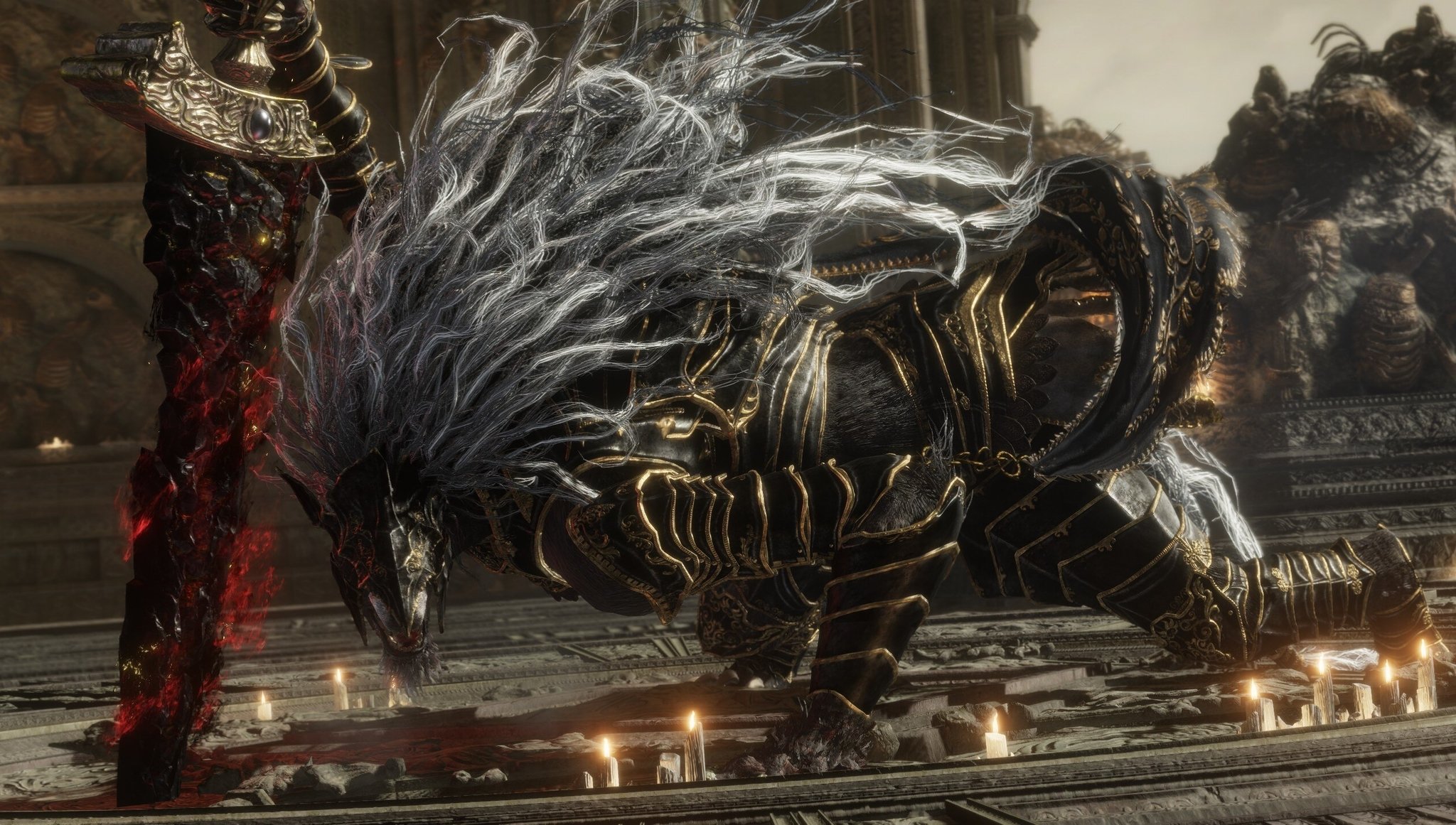
Maliketh, the Black Blade is one of Elden Ring’s most unique boss battles, as its first and second phases are significantly different from one another. In his first phase, Maliketh takes the form of a beast clergyman, attacking the player with rapid dagger slashes and bestial incantations that he casts quickly. In the second phase, Maliketh embraces the power of the Death Rune and becomes significantly more agile, assaulting players with slower, but heavy-hitting greatsword attacks as he flips around his spacious arena.
Both phases are incredibly fun, especially since Maliketh’s attacks are very readable. To me, bosses that change significantly between phases have always been some of the most interesting, so I loved fighting Maliketh. The massive temple Maliketh resides in is a fantastic arena, too, and the deep chanting and frantic strings in his boss theme gave the encounter a grandiose, heroic feel.
3. Godrick the Grafted

Godrick the Grafted may be one of Elden Ring’s earliest bosses, but that doesn’t mean that he isn’t a phenomenal one. The use of both slow and delayed attacks as well as swift ones, makes learning how to avoid them challenging, and his wind-powered moves give players great opportunities to land several hits of their own. Godrick’s earthquake-like shockwaves can also be jumped over, which is not only fun, but also gives players a chance to use powerful jumping attacks.
In the second phase of his fight, Godrick cuts off his own arm and then grafts a dragon head to its stump. This is easily one of the coolest and weirdest things a FromSoftware boss has ever done, and it leads to Godrick adding a repertoire of grapples and fire breath attacks to his moveset. These additional moves and buffs make the fight with Godrick even more intense, giving the battle a powerful climax.
And it all works due in part to his arena. The middle of it is completely open and is the ideal place to try and deal damage to Godrick, but the left and right sides are covered with large headstones that players can use as cover. These headstones can be destroyed — Godrick will eventually do so to reach the player — but I appreciate that FromSoftware created an arena that rewards players for paying attention to and using their surroundings, even if it is temporary.
2. Radagon of the Golden Order and the Elden Beast
Elden Ring’s final boss fight is one of the game’s best, and it’s also one of the best battles FromSoftware has ever made. The first phase has you go up against Radagon of the Golden Order, a humanoid foe that uses a variety of different swings and slams with his hammer as well as grapples, jump attacks, and explosive Faith magic. It’s a fight that requires great dodging skills and situational awareness, which makes for a fun and intense challenge.
Once you defeat Radagon, the second phase begins and you end up face-to-face with the Elden Beast, Elden Ring’s true final boss. This gorgeous beast gracefully swims and flies through the cosmic and otherworldly arena, assaulting you with massive slashes and thrusts from its magical blade as well as a huge number of different magical area-of-effect attacks that will test your ability to strafe and dodge. Mastering this encounter is an absolute blast, and whenever you dodge the Elden Beast’s sword attacks, you’re rewarded with huge windows of opportunity for your own damage.
Ultimately, it’s pretty much everything I could ever want out of a final boss encounter. Between the excellently designed gameplay, the breathtaking Elden Beast boss arena, and the superb soundtrack, the fight with Radagon and the Elden Beast is simply incredible.
1. Godfrey, First Elden Lord
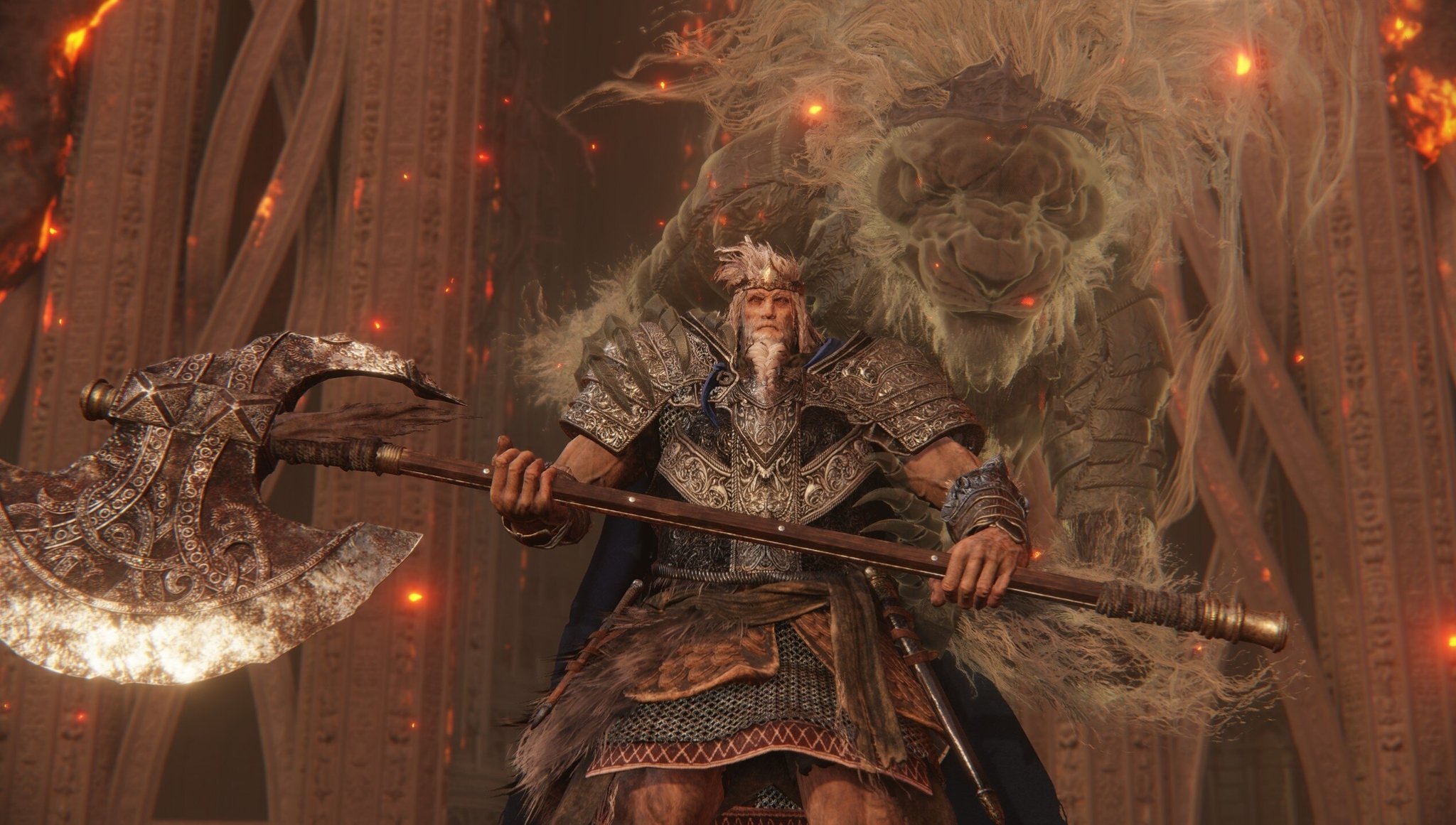
It might only be the penultimate boss battle, but Godfrey, First Elden Lord takes the top spot on this list. Godfrey stands guard in front of the Erdtree, determined to stop you from becoming an Elden Lord yourself — and it’s up to you to take him down and prove that you’re worthy of the title. In the first phase of the fight, Godfrey uses a large variety of mixups with his massive battleaxe, swinging and slamming it in an effort to tear you apart with his high damage. Like Godrick, he uses both delayed and quick attacks in an attempt to throw you off, but successfully avoiding these deadly combos will net you several chances to get in hits of your own. Also like Godrick, Godfrey occasionally creates shockwaves you can jump over and use as opportunities to land jump attacks.
Once you get him to half health, Godfrey then begins his second phase, revealing his true identity as Hoarah Loux and becoming significantly more aggressive. He tears off his armor and throws away his axe, instead choosing to rip you to pieces with his bare hands. In addition to his furious physical attacks, Loux also has the ability to leap towards you, throw you into the air, and pummel you back into the ground. His attacks in this phase are vicious, but they’re all well telegraphed and punishing Loux with your own attacks is exhilarating.
As Loux nears death, he will empower all of his stomp and slam attacks with damaging shockwaves that blanket the entire arena, forcing you to jump over them skillfully. It’s difficult to get the hang of this, but if you do, you can use these slams to land jump attacks like you could in the first phase, dealing great damage to Loux and potentially staggering him as well. Ultimately, every second of this fight is intense and challenging, yet also completely fair and rewarding. I had an immense amount of fun fighting Godfrey, and there’s no doubt in my mind that he’s one of the best bosses that FromSoftware has ever designed.
Elden Ring is finally here, and it’s available for $60 on Xbox Series X|S, Xbox One, PS5, PS4, and PC. It’s one of the best Xbox games you can play right now if you’re a fan of challenging RPGs, and we strongly recommend it.
We may earn a commission for purchases using our links. Learn more.

Ancient Windows 1.0 Easter egg unearthed, features Gabe Newell
Just when you thought the lore vaults of ye olde Windows 1.0 had been exhausted, a new entry appears. And it gets even more exciting: This particular nugget of knowledge contains a reference to none other than Valve’s very own Gabe Newell.





